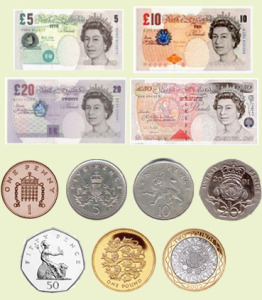Local Currency in Northern Ireland
Dollars? Rupees? Yuan? Baht? Riyals? Euros? Pounds?
What is your local currency called and what is it worth?
The local currency are called “pounds” or “pounds stirling” and are used throughout England, Scotland, Wales, and Northern Ireland. The sub-currency is called “pence” (like “cents”). Pounds are issued in £5, £10, £20, £50, and £100 notes, and the pence (p) are issued in 1 penny, 2p, 5p, 10p, 20p, 50p, £1, £2 denominations. 100 pence equal £1 (which can also be written as £1.00). The currency consists of both paper and coin money so you may want to consider investing in a coin purse or wallet with a zippered section for coins.
Shillings, crowns, and guineas are no longer used as British currency. The only units of money currently used are pounds, pence, and penny. Instead of writing “20 pence”, oftentimes it will be abbreviated at “20p” (said like “twenty pee”). Also, when saying currency amounts aloud, one would call £6.50 “six pounds fifty” instead of “six pounds fifty pence”.
Northern Ireland and the Republic of Ireland do not share a common currency, as they are considered separate countries. The Republic of Ireland uses euros, while Northern Ireland is part of the UK and uses the pound. However, it is not uncommon for both euros and pounds to be used in areas near the border, such as Londonderry and Belfast.

For a current exchange rate visit xe.com
Tipping in Ireland:
While tipping is not as common in Ireland and Europe as it is in the United States, it is still expected in some scenarios.
- Hotels and Lodging: If you are staying in a hotel and you have a porter, tip them €1 – £2 per bag, if it is brought to your room. Generally you would not need to tip over £5. For housekeeping services, if you leave a mess, it may be polite to tip £1 – £2 per night.
- Restaurants: Generally, you should tip 10-15% of your bill, based on the quality of service, as you would in the United States, unless the “service charge” is already added to your bill.
- Bars: Tipping is generally not required in bars, and is not a common practice.
- Tour Guides: If you take a private tour, you should tip your tour guide about 10% of the tour cost. If you are in a group, and the tip is not already included, consider chipping in £1 – £2 individually.
- Taxis: Tipping is not required of taxi drivers, but it is common for people to round up to the nearest euro of their cab fee. However, if the driver is especially helpful or informative, a tip is always appreciated.
- Hairdressers: It is a standard practice to tip your hairdresser 10% of the final bill, depending on service.
For more information on tipping abroad, see here.
Accessing your money abroad:
We recommend using your banking card (ATM/debit) from your U.S. bank. Using ATM cards enables you to access your own personal bank account from any ATM machine around the world. The primary advantages of getting money from an ATM are 24-hour access and preferential exchange rates.
IMPORTANT INFORMATION ABOUT USING YOUR DEBIT CARD ABROAD:
Check with your bank to make sure you can use your card overseas, and to inform them that you will be living abroad. Give them your dates, and all the countries you anticipate traveling to. It is not uncommon to be cut off from your bank account after using your card abroad, even after giving them forewarning. If this happens, don’t panic! Banks do this to protect their clients, and we should be grateful! If this happens to you, you just need to contact your bank to ensure them that you are in possession of your card and that you need to have access to your account while you are abroad. If you have a shared account with a family member and their name is also on the account, sometimes it’s helpful to get word to them to call the bank for you, considering the time difference between countries.
In order to withdraw cash from an ATM using a debit or credit card, you must have a 4-digit pin. While you’re most likely very familiar with your debit PIN, you might not know a PIN for your credit card. Be sure to ask before you travel, banks will not release this information over the phone, via text, through an email or in any other way than to mail your PIN to the mailing address associated with your account.
Many ATMs in Europe only accept debit/credit cards that have the Cirrus, Plus, Visa, MasterCard, or American Express symbol on the back of the card. It is a good idea to have both options available – an ATM card and a credit card – just in case of an emergency. When you use your bank card, the ATM machine will automatically convert the money into the local currency for you.
#CISAbroadtip – ATMs in the UK are called “cash machines”.
*Please ask your bank about their fees associated with international transactions, they may charge you anywhere from $5.00 to $7.00 per transaction, and that adds up!
